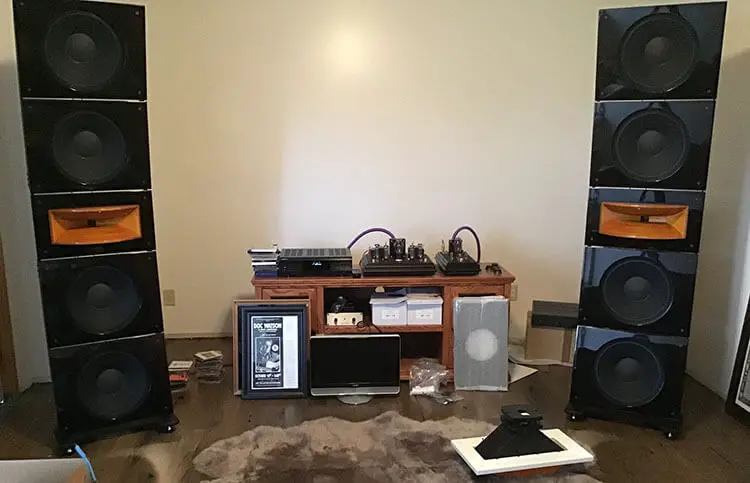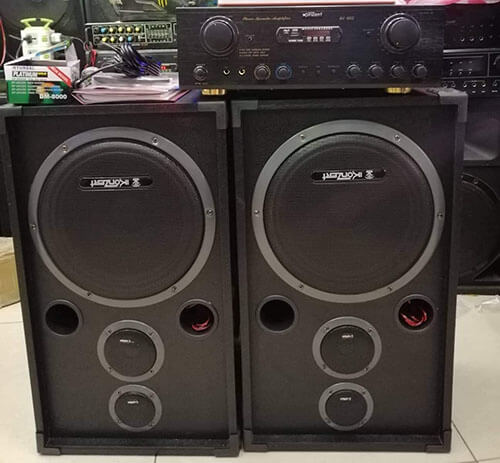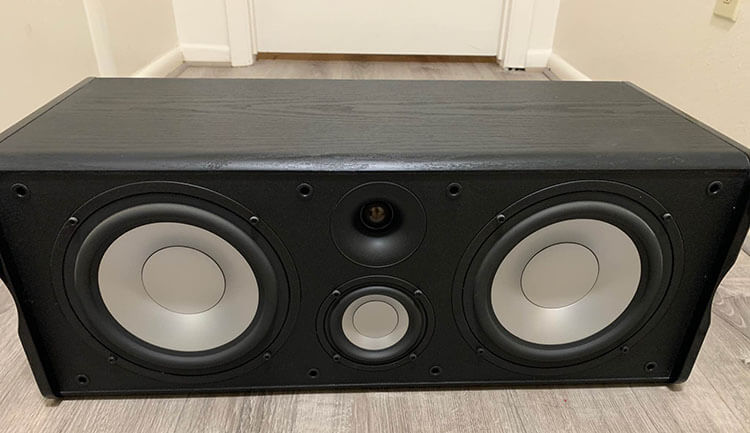The dilemma of choosing the right speaker wattage based on the room size can be tricky, as your desired Speakers might exceed their capacity compared to the room size. While speaker wattage is one thing to consider when getting speakers based on your room size. There are other things that you need to consider, like speaker sensitivity, levels, and wattage. For your average size room, any speakers ranging between 30-50 watts should be good enough. But, as the room’s square feet increase, you may require to up your wattage as well.
There are other things to consider as well, so let us dive in without wasting any time.
What is the ideal speaker wattage based on room size?

Everything depends on your room size. The bigger it gets, the more power it will require. So, your idea should be to, first and foremost, know the square feet of your room. Like 18 feet by 15 feet (Around 300 square feet), room size is relatively moderate for anyone renting a studio apartment or your house’s room. For that sort of room, you don’t need gigantic 200 watts of speakers; anything around 25-50 watts per channel speaker should surround your room with good sound.
Now let us go through the speaker and amplifier wattage you’d require for the area you’d be using your system.
| Room Size by Feet | Wattage Required for speakers (RMS) | The wattage required for Amplifiers | Remarks |
| Normal Room 18 feet by 18 feet (300-400 sq. feet) | 25 Watts Per Channel | 50 to 80 Watts | This is for your regular rooms where you just want a regular sound setup. |
| Living Room 20 feet by 24 feet (550-700 sq. feet) | 35 to 40 Watts per Channel. | 60 to 80 Watts | This is for living room space or your meeting room inside the office. If the sound isn’t loud, you can get less powerful speakers if you want. |
| Home theater Setups 500 – 800 Sq. Feet | 40 watts per channel, higher for Subwoofers. | 60 to 80 Watts | For Home theater setups, it is important to get things right. So, make sure you get at least 30 watts per channel of efficient speakers. You should be okay with rooms that are around 8-10 feet in the ceiling. |
| Hall Rooms or Large Gatherings 1000 Sq. feet or Above | 80-200 watts per channel. | up to 500 watts or more depending on the speakers. | These are averaged-sized parties or shows filled with people. In this case, you may require professional help instead of purchasing every single thing on your own. |
Important Note (RMS): When looking for watts in the speakers, make sure that the wattage you choose is not the peak wattage. Because peak wattage is the maximum threshold, it’ll start to overheat, and you may burn, possibly destroying your system. What you should be looking for is the RMS. Basically, RMS will give you an idea of what your speakers can actually handle.
Importance of SPL: Do decibels affect the wattage of the speaker?
For you to understand wattage, it is also significant to understand that sound sensitivity is related to wattage. The distance where you listen from your speakers also impacts the right decibels and wattage. It is basically through the power from the speakers (Watts) how accurately clear sound comes. To give you a basic understanding of how the amount of decibels is perceived by humans, here is a picture from ResearchGate
Notice that 60 Db is okay for having a conversation. Now, for listening through your speakers, obviously, you need to crank it up a bit as the volume will be higher than having a conversation. The average Decibel is around 85 to 95 DB.
Sound Level Pressure
Just like two things increase at a similar flow in Mathematics. You could also think that SPL and the power level of speakers increase similarly. But, the situation is a bit technical. The values of SPL follow a logarithmic sequence. In a nutshell, if you have two different speakers, one of 35 watts and another 70 watts, you may think that the power and the sound quality may have doubled, but in reality, your decibels have increased by 3 db.
To make it more transparent, if you own 87-decibel speakers, so for every 1 watt and for 1 meter, you’ll be listening. Now, if you double the number of watts for 2 watts, you will now be getting 90 decibels from your speakers.
For your clarity: Informational Table

Here is the list of information about Decibels so that you understand what you are working with. I’ve given you an example of a speaker that has a decibel rating of 95 and how many decibels you’ll be dropping based on the distance you’ll be moving away. I’ve gotten some of the data with the help of PLAudio
| Watts. | Decibels Coming(95 Decibels) | Distance | Decibels Dropped |
| 1 | 95 | 1 meter | 0 |
| 2 | 98 | 2 meters | 6.02 |
| 4 | 101 | 3 meters | 9.54 |
| 8 | 104 | 4 meters | 12.04 |
| 16 | 107 | 5 meters | 13.98 |
| 32 | 110 | 6 meters | 15.56 |
| 64 | 113 | 7 meters | 16.90 |
Is speaker wattage everything when it comes to room size and speakers?

It is a common notion, and since you are going through this discussion of mine so clearly, you, along with other people, may think that watts are everything in a speaker. Well, it actually is not because Watts is the measurement of the electrical current for the speaker. Instead, it doesn’t give you any idea about its loudness or clarity.
Many people misuse the wattage of how loud it can be played, which is a common misunderstanding. People instead should prioritize the wattage of an amplifier or the receiver. Because the wattage of an amplifier will essentially power the speakers. If the wattage is low, then clearly, you won’t get your desired sound no matter how high your speaker’s wattage is. In fact, the power of your amplifier should be twice the perceived or certified wattage of the speakers.
Brief: Other things to consider when buying speakers based on your room size?
Now that we are past wattage and decibels, I would now like to enlighten you on a few other basics to make your setup complete. You could have the right speakers with the right wattage and decibels, but it could be something as simple as the placement, which is ruining your experience.
- Speakers’ Height plays a huge factor because if you own large speakers that are your ceiling height, then you will face a lot of distortions. Your speaker size should be half or less than your room’s height.
- Find the area where the reflections and where you’ll be listening to placed in balanced or equal proportions to your room.
- Get a Speaker stands If you have a very high bass setup since putting speakers on the floor will lead to unbalanced, torn sounds.
- Something as simple as putting unnecessary cables or devices will lead to major distortions.
There are a few other things to consider If you want to know more details as well as, you are confused regarding your newly bought floor-standing speakers, then I may have another complete guide for you.
Frequently Asked Questions (FAQs)
Based on speaker wattage, should I go for active or passive speakers?
It totally depends on your room size and how deep you want to go. In short, if you’re someone who just wants to get plug-in and start listening to speakers, then get active speakers. Active speakers basically have everything built-in, along with the most important component, which is the amplifier.
Whereas, if you are an enthusiast and want to build a setup from scratch, then I’d say go for passive speakers but do remember passive speakers don’t run on their own.
How many watts do I need if I am hosting a party?
Based on what I have spoken about above, by now, you should have a decent idea of what watt you should get based on the room size. But, other than that, if you’re hosting a party, then it entirely depends on a few criteria based on the table I’ve shown. First and foremost is, of course, determining the number of square feet, then following with the number of guests arriving. These two things will let you choose how many watts you’ll be needing per channel. After deciding the wattage, you then need to make tweaks here and there, if it is indoors or outdoors.
Is it okay to have an amplifier that has more watts than the speakers?
Yes, it is okay to have an amplifier that has more power than your speaker channels. But, if you crank the volume up to the speaker’s limitations, then you’ll hear a lot of distortion noises. Keeping up the volume for a long period will result in permanently damaging your speakers as they’ll start to overheat, which could lead to the coils getting burned off.
To Summarize!
This truly has been a long discussion, and I hope you have gotten to understand some of the key ideas so that you don’t buy the wrong speakers. It is okay if you get the extra watts but getting a set of speakers that are built to throw a concert for your small room is rather foolish. It is a marketing scam by the big companies to lure you into buying their expensive products, so don’t get triggered by a high watt rating. Instead, prioritize the RMS rating of your speakers.
Also, another thing that I hope you’ll understand is that you need to value other things apart from wattage to have an absolutely immersive sound experience.
